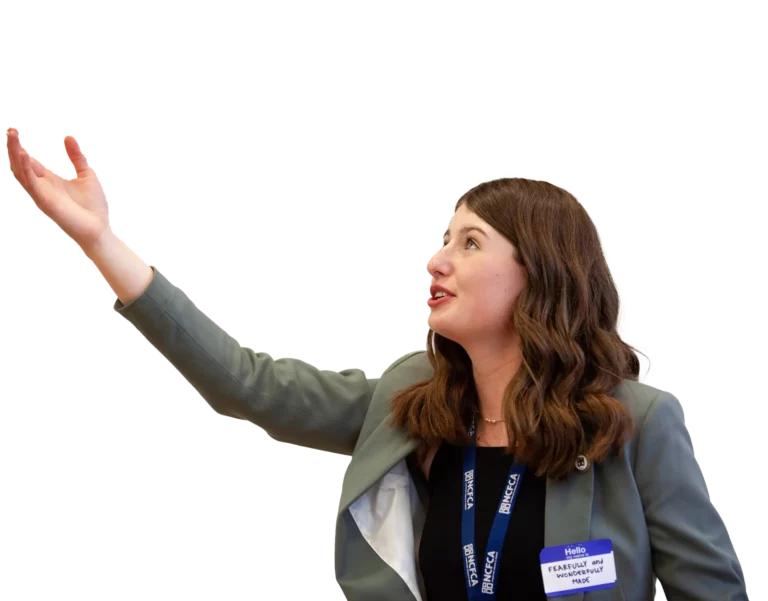Welcome to Open Interpretation!
This event explores a single, published literature selection and is presented by a single competitor. Students face the challenge of dramatizing all of their own characters and scenes. Presentations range from hilariously funny to heart wrenching.

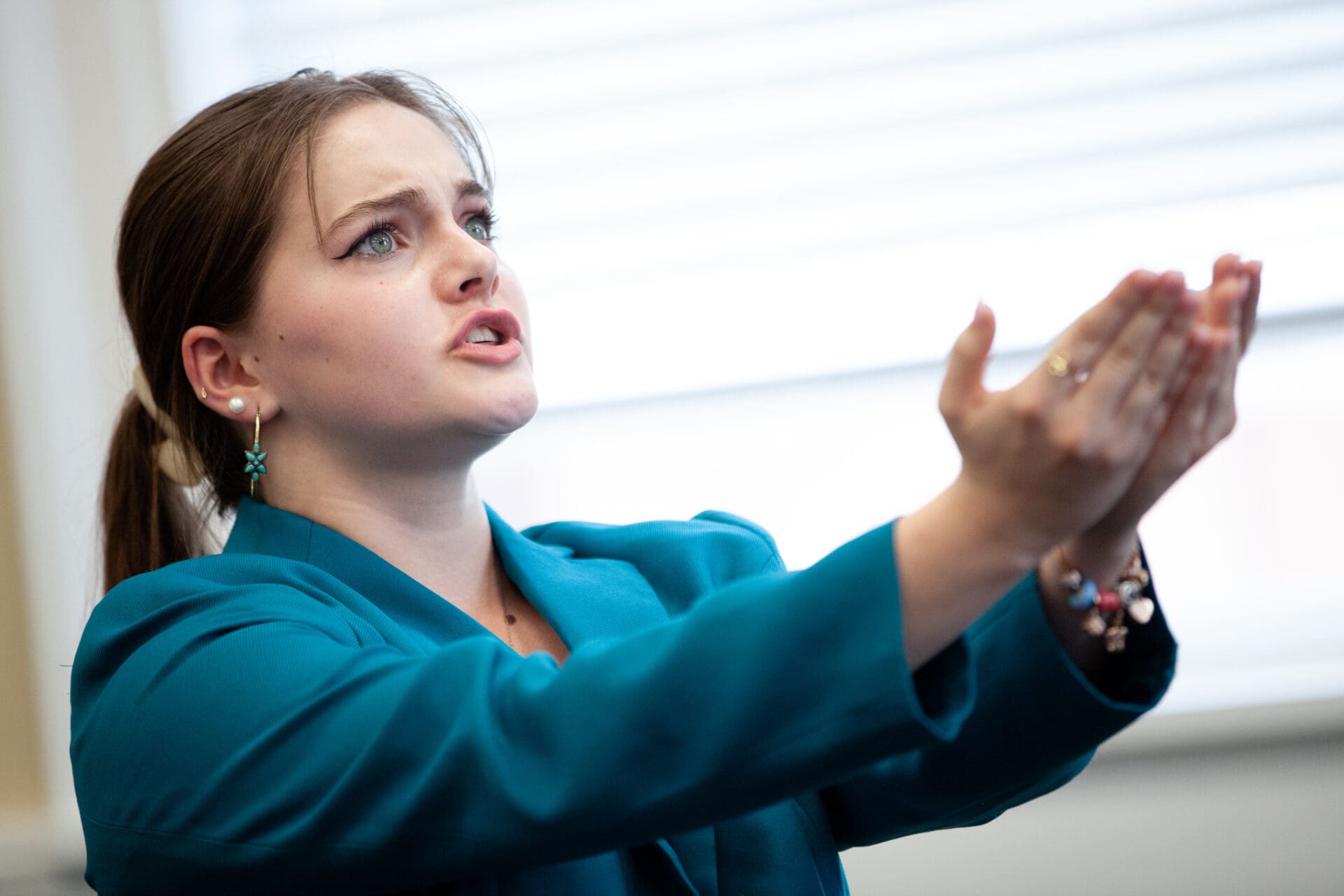
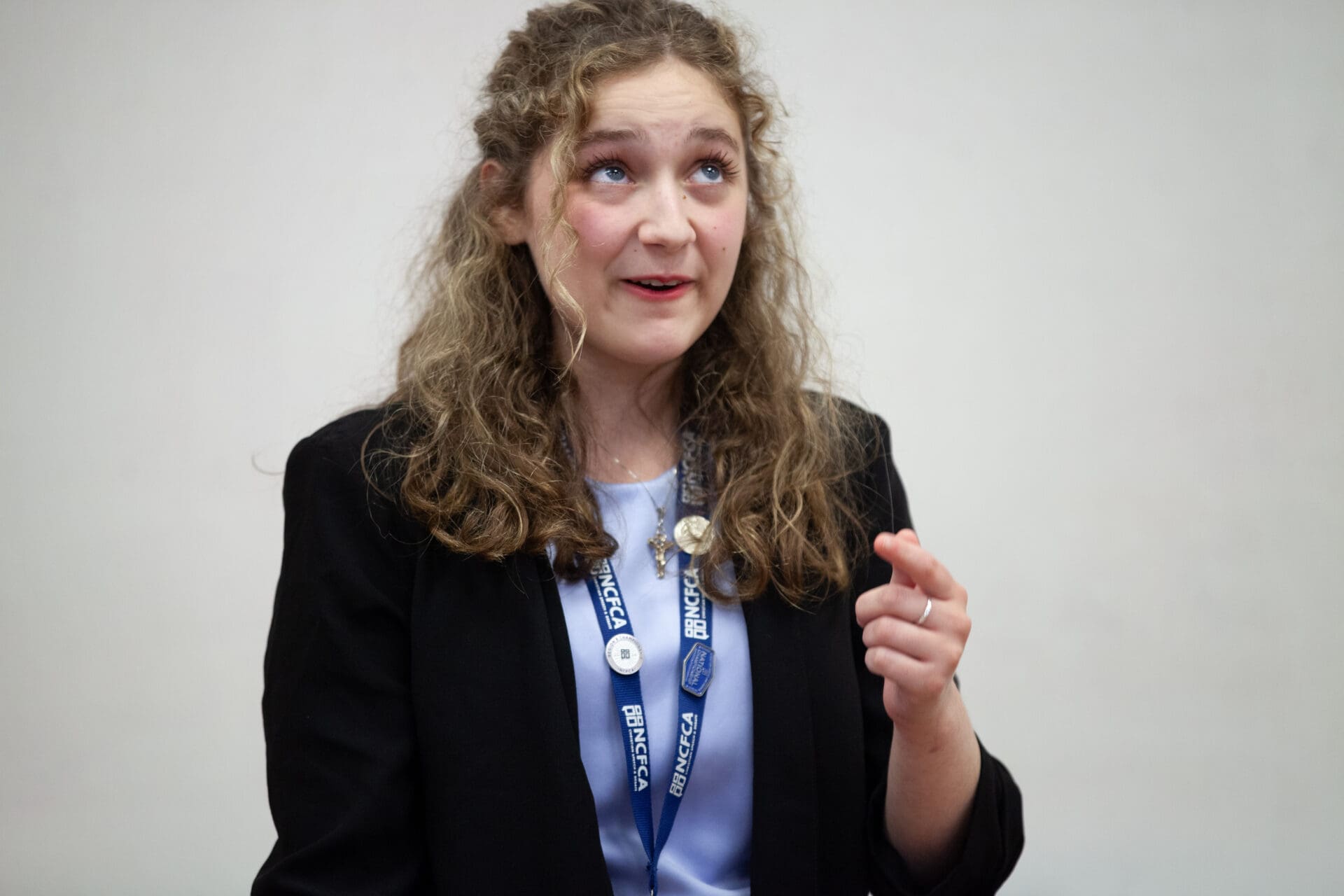
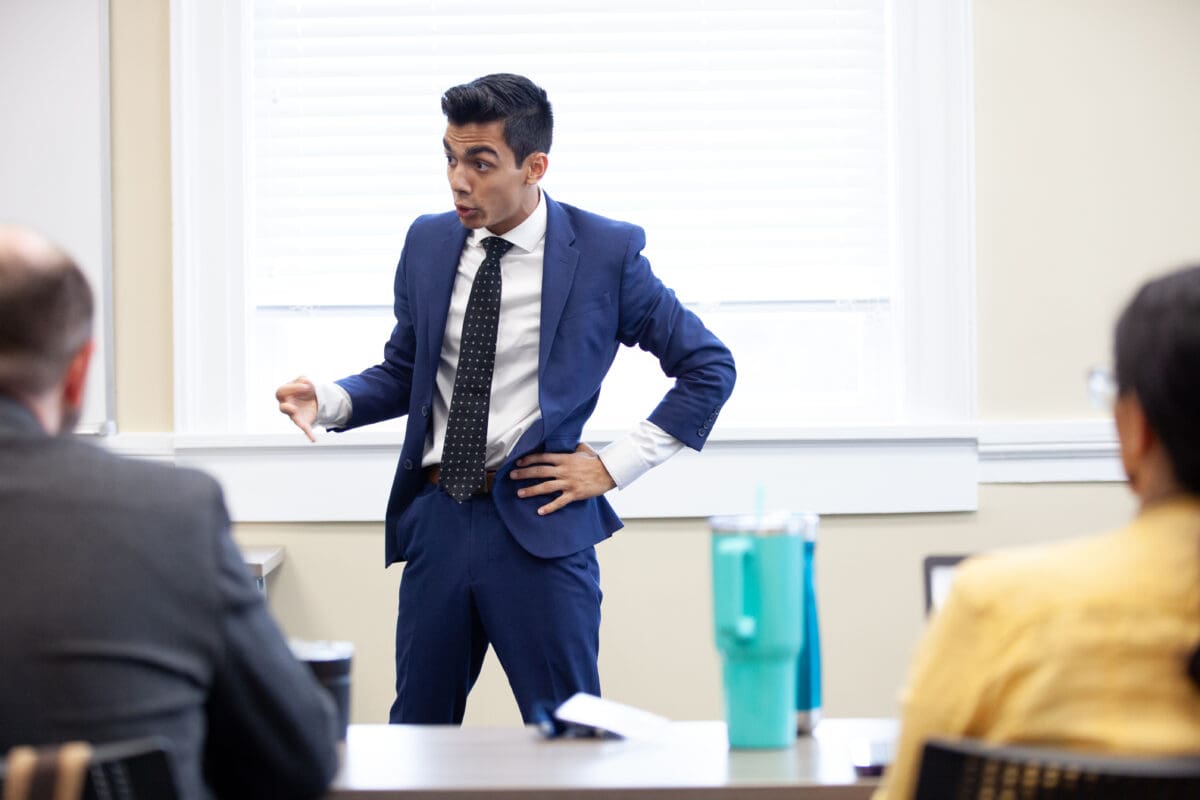
How This Event Works
Students adapt a published piece of literature into a ten-minute presentation, cutting words from the original source to form a script and bringing the characters to life though acting and blocking. With all of their lines memorized, they endeavor to deliver an enjoyable and meaningful presentation to the audience.
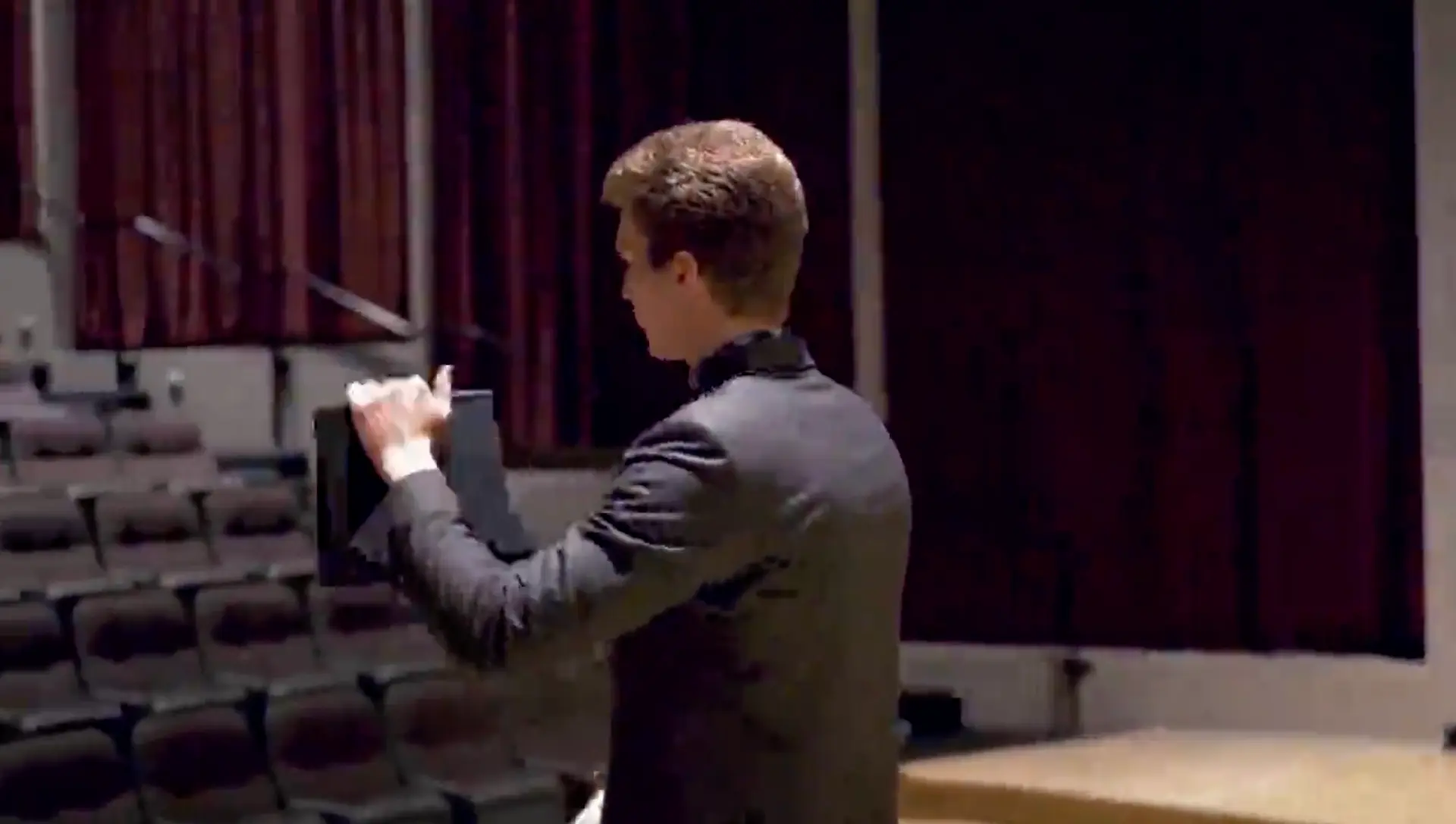
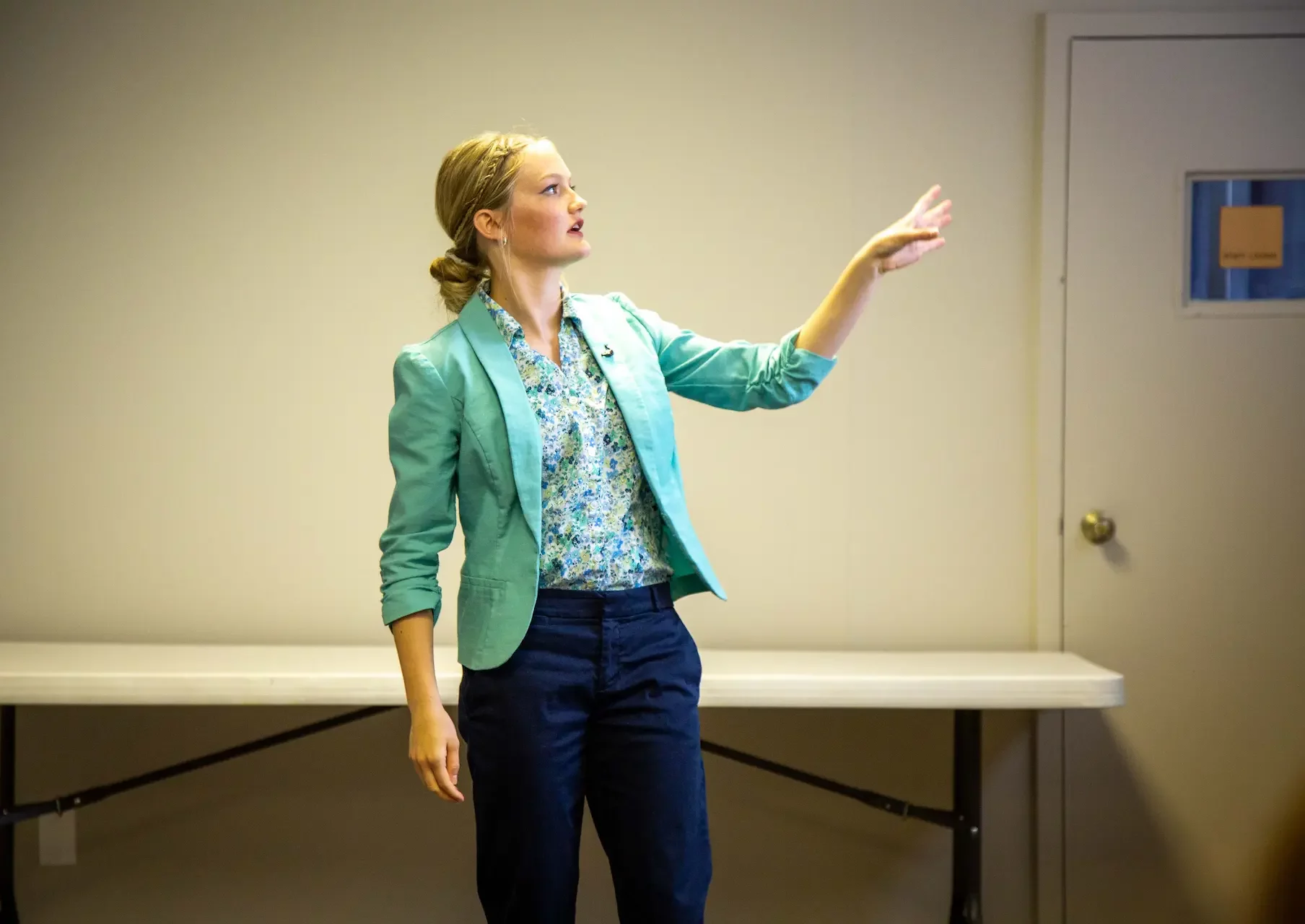
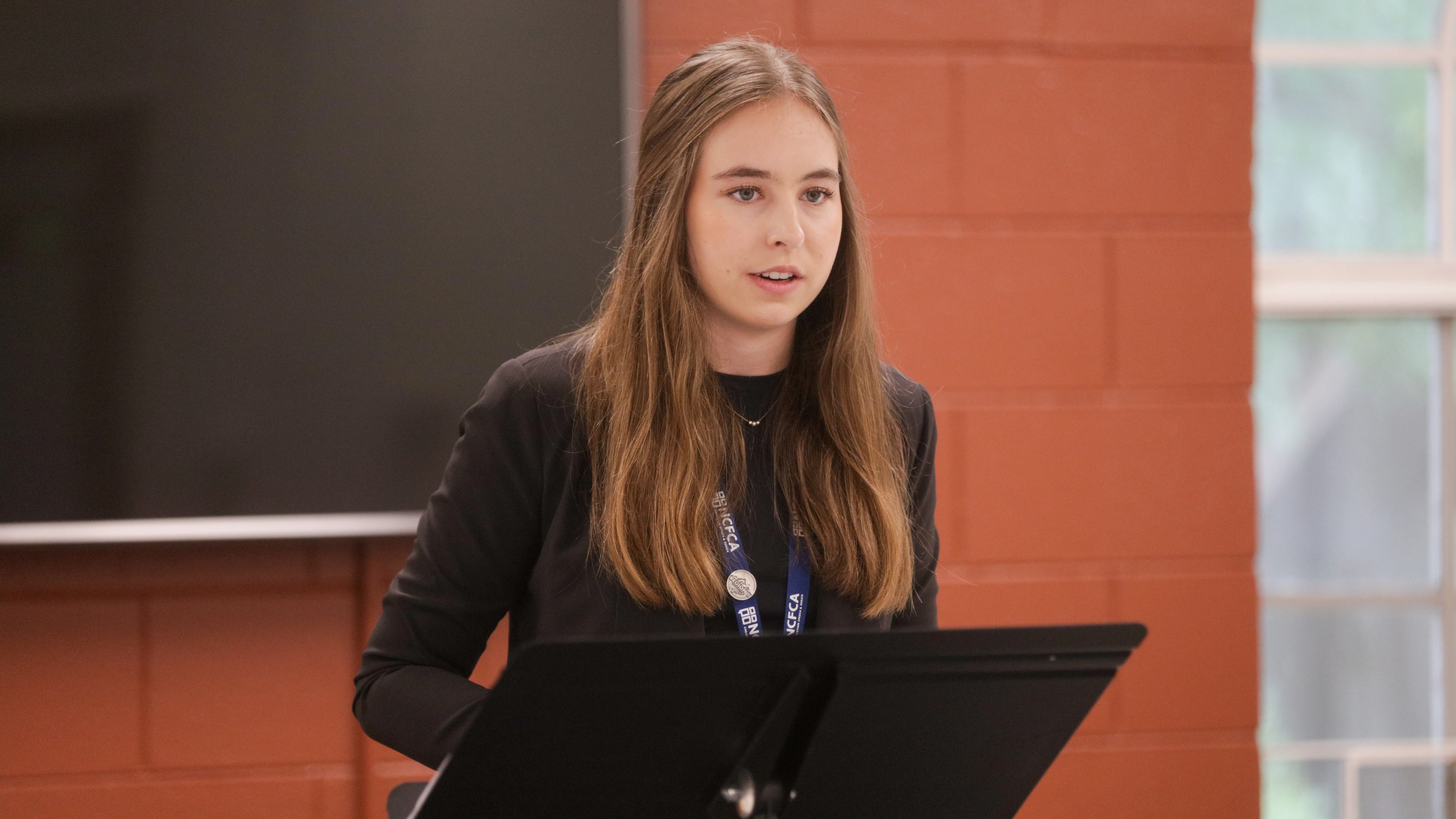
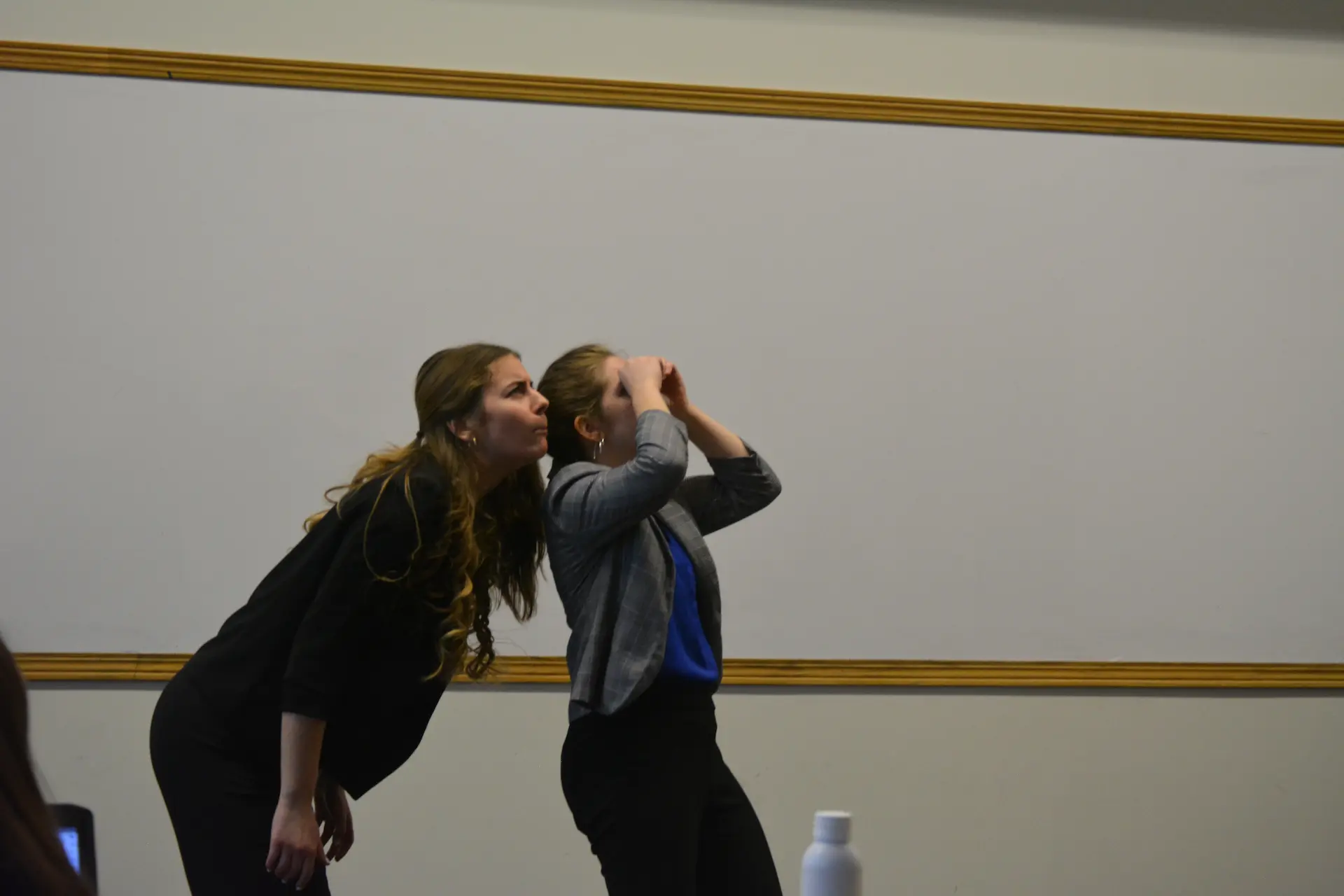
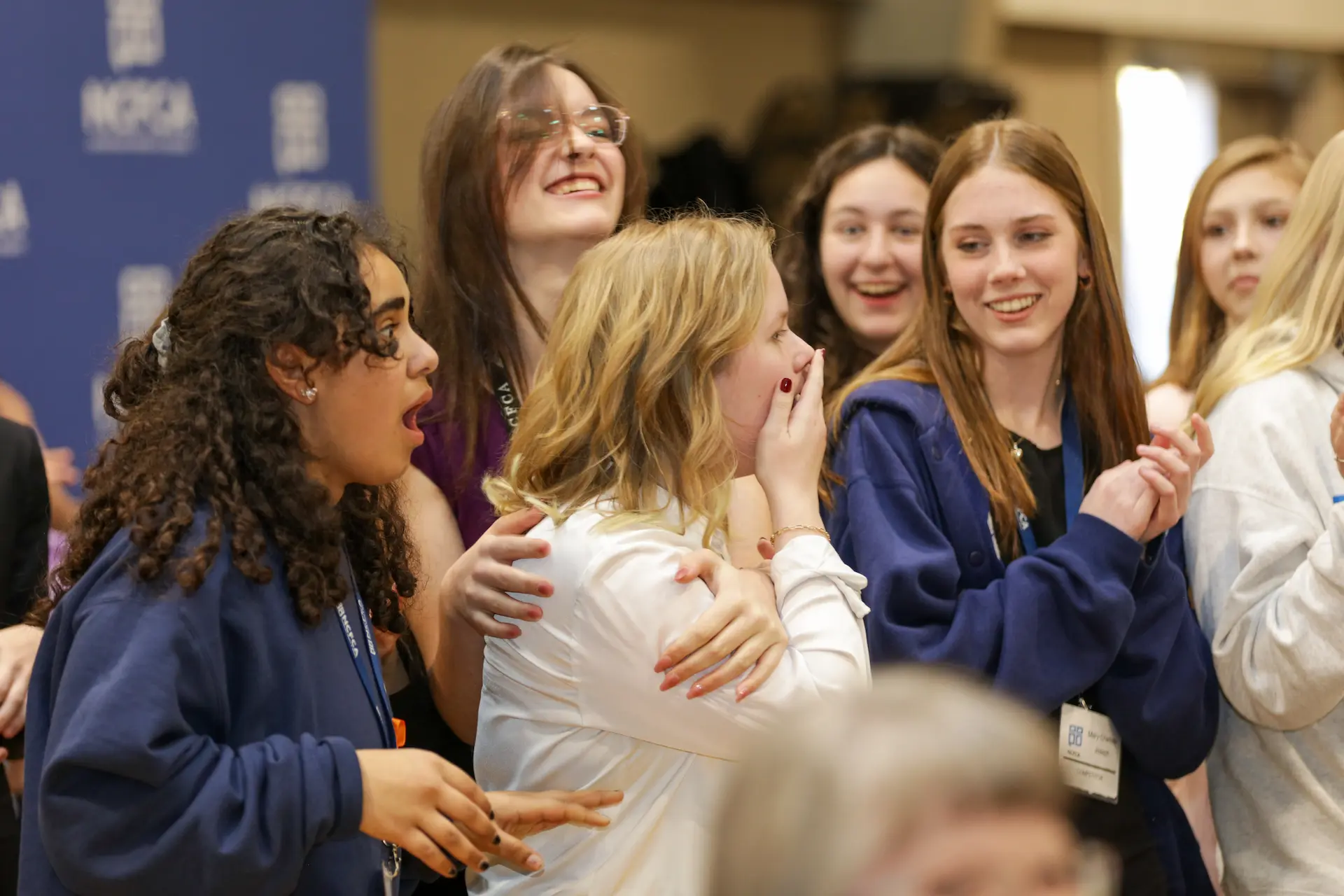
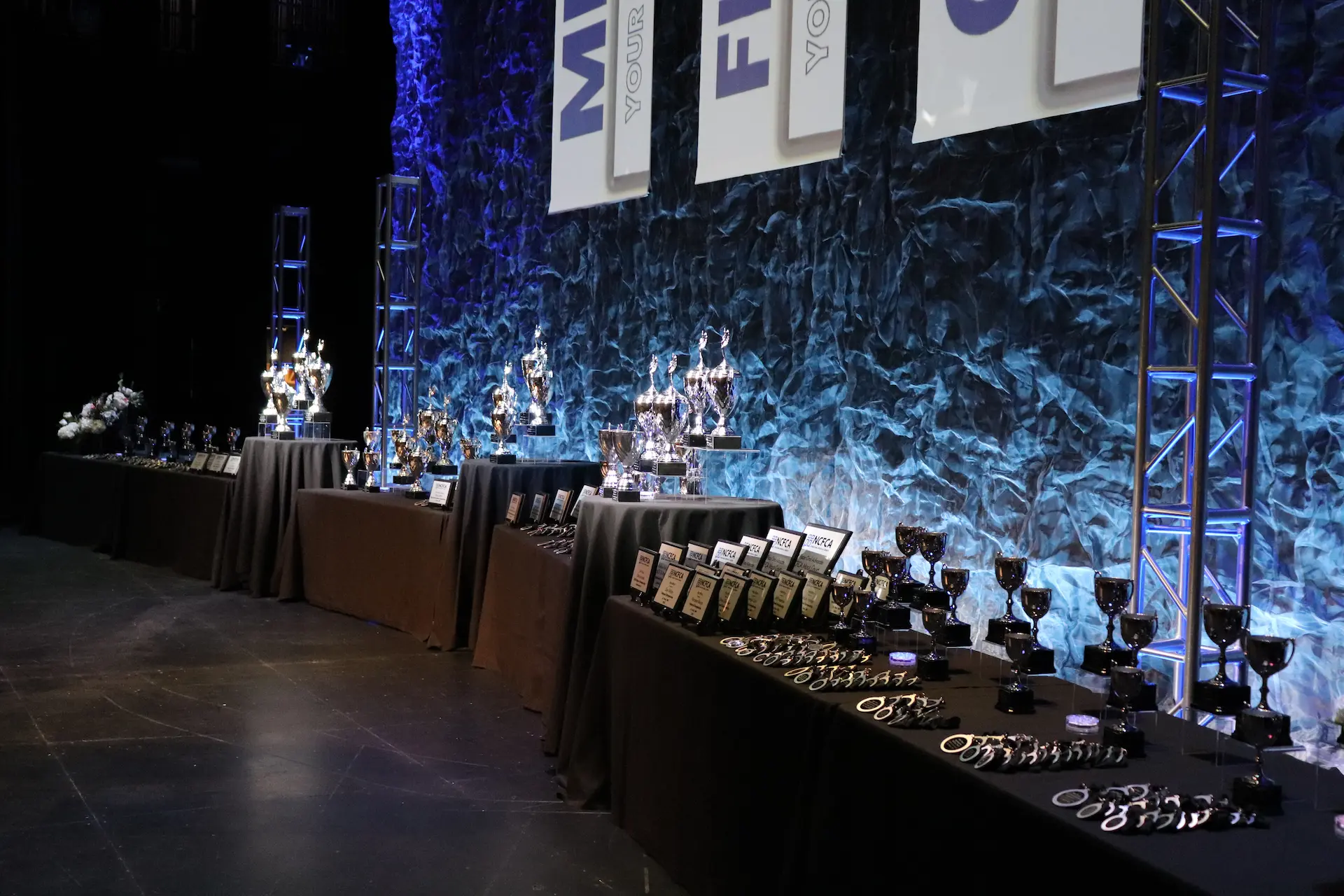
Open FAQs
Why should I participate in Open Interpretation?
Interpretation speeches ask students to bring a piece of literature to life through blocking and characterization. Open invites students to:
- Engage emotions. As students interpret stories, they can engage the emotions of the audience in a way facts can not.
- Shape thinking through stories. By turning a favorite story into an Interpretation speech, students will be able to communicate truth in a manner that resonates with the audience.
- Broaden perspectives. Stories broaden students’ perspective as they discover characters whose lives, experiences, and beliefs are very different from their own.
- Improve skills. Interpretation speeches challenge students to talk and act like a variety of characters. Open Interpretation can help students to overcome their vocal and physical delivery.
How many times do competitors give their speeches during the tournament?
During preliminary rounds, competitors will give a speech three times for every event in which they are entered. If they advance to elimination rounds, they may give a speech in a SemiFinal or Final round as well.
How are NCFCA rules and policies enforced?
Every type of competition has rules, and NCFCA is no exception. Our tournament Compliance teams and our National Adjudication Team work throughout the season to ensure a fair and level playing field for everyone involved. Learn more about how rule enforcement works by visiting our Compliance FAQs page.
Can I dance as much as I want in my interpretation speech?
The rules do not prohibit dancing. Judges will determine how effective any dancing is to the speech delivery.
Can I incorporate sound effects into my Duo or Open Interpretation speech?
Yes, sound effects are permitted and can be appropriate for some interpretations of literature selections.
Can I use a graphic novel as my literature selection for Duo or Open Interpretation?
As long as the selection complies with the other rules, you may use a graphic novel as your literature selection. Judges will determine the literary merit.
I would like to use a movie script for Duo or Open and want to make sure it is allowed under the rules. What does “published” mean?
The definition of “published” has delineated movie and tv transcriptions in order to distinguish literary works that have been published from creative works that have been produced. Additionally, our events define literature as “plays, prose, or poetry.” Unless a movie is also published as a play, prose, or poetry, it would be prohibited by the rule. More often than not, screenplays are not published plays, prose, or poetry, but are instead a stepping stone to production, and therefore it is very unlikely that a screenplay exists within the rules.
What does “original dialogue” mean for Duo and Open Interps?
Original dialogue is dialogue written by the competitor. You may write original dialogue if you want to create your own original characters for your introduction and conclusion. You may not write your own words for the author’s character to speak.
In your introduction and conclusion, you may also quote a portion of the literature selection – the author’s dialogue, for example. In that case, competitors may even present the author’s quoted dialogue as the author’s character. Remember though, you must cite the quoted words as supporting material.
What is meant by a “single literature selection”? Does this mean that I may not reorder events from my literature selection, or take one cut from the end of the book and place it toward the beginning of the speech?
You may cut and arrange the dialogue and events as described in the question. “Single” becomes applicable when using a book that contains short stories or other independent works, such as poems. Taking parts of these and weaving them to form a new story is not allowed.
How does NCFCA view plagiarism?
NCFCA does not approach a rule infraction as an intentional action, but rather an opportunity for effective communication growth. The rules and the adjudication process exist to maintain fair play for the competition, which is a tool for growth. NCFCA does not seek to judge the heart of competitors or affiliate families. However, we do not deny the refining heart process that happens through the adjudication process; in fact, we embrace it because it allows the Lord to sanctify His children. This refining is part of how NCFCA, including staff, parents, and students, fulfills our mission, “to challenge and equip ambassadors for Christ to communicate truth with integrity and grace.” Whether intentional or not, plagiarism will be adjudicated.
(Watch 🖥)
How can I tell if I’m plagiarizing?
A bright-line test is to ask, “Is this mine? Did I make this, or did I receive this?” As a fundamental commandment, “Thou shalt not steal” (Exodus 20:15), we ambassadors for Christ should take issues of academic ownership as seriously as we do physical, material ownership. You should not copy and paste sentences or even phrases and call it yours. Even if you are summarizing someone else’s ideas, they should receive credit. If it’s unclear to you, asking for advice from parents and coaches is always wise.
If I see a speech on YouTube I really like, can I take most of that content, since it’s not published?
Being published may seem like a bright line to whether or not one must give credit, but this is not the case. Supporting material includes any information, details, research, theories, stories, lyrics, tunes, or ideas obtained from another person or source–whether directly quoted, paraphrased, or summarized. This is regardless of publication. Therefore, even if you don’t have to pay to watch a YouTube video, copying that content requires citation. Even if you see a speech given at a dinner event, copying any portion of that content requires citation. Further, if your copied material starts looking like that whole speech, then it is not your speech anymore. Calling it so would be plagiarism. It’s important to remember that speeches must be prepared by the student and delivered during the current competitive season only. (Aside from Apologetics, for which students may use their preparations in subsequent years.) Any supporting material should be just that: supporting the speech that the competitor has crafted.
Can I reuse my older sibling’s script for an interpretation event?
A script that is prepared by a sibling and then delivered in a subsequent season does not conform to the expectation for any speech. In an interpretative speech, the expectation is that the cutting of the literature selection(s) and the crafting of the introduction/conclusion/narrative sections should be completed by the speaker of that speech in that current season. In addition, the blocking and characterization should also be original and developed primarily by the speaker.
Coaching Tip: Younger siblings or newer competitors who may need more help in the preparation of a speech may choose to use a book that does not require significant cutting. Also, lots of help from others is encouraged!
How much can my family and friends help me with my speech?
Receiving guidance, inspiration, and mentoring is encouraged as you develop your speech. In order to be your original work, though, the decisions about the work and the words of the script must be yours. The examples below may help you discern how to receive help while maintaining academic integrity.
Student-Driven Process That Produces Speaker’s Original Work:
- Family coaches you at the dinner table, giving you feedback on your ideas as to how much they like them, and you use what they seem to prefer more.
- Mom asks questions about your ideas, helping you clarify what you really mean to convey.
- Brother suggests a couple of other character ideas. You accept one of those ideas as you refine your storyline.
- You ask your friend’s opinion about how a scene makes them feel: was it believable?
Others-Driven Process That Does Not Produce Speaker’s Original Work:
- Family offers a few written examples of how to make your idea better; you copy and paste some of those since you like them.
- You assign your siblings different parts of your story, and then you edit them together to make one story.
Do I have to cite a tune that everyone knows like “Silent Night”?
Common knowledge that is known to most people does not need to be cited in any way (e.g., George Washington was the first U.S. President, Jesus rose on the third day, words to a universally known hymn such as “Amazing Grace”). Some tunes may fall into the category of common knowledge and not need to be cited. However, a tune considered “well-known” can be somewhat subjective. (Watch 🖥)
Rules Changes Overview for 2024-2025
The changes to Speech Rules for 2025 have been approached with three major goals in mind:
Simplification
Transparency
ClarificationSimplification:
For the past several years, the Speech Guide has contained General Rules, Timekeeping Rules, Category Rules, Event-Specific Rules, and Script-Submission and Script-Use Rules. The 2025 Speech Rules will only contain rules for each specific event. (i.e., All rules for Apologetics will only be in “Apologetics Rules.”) Timekeeping guidelines, script-submission guidelines, tournament protocols, and other helpful information and examples will still be found in the 2025 Speech content but will not be considered rules which could receive a penalty.Transparency:
The 2025 Speech content now includes a Penalty Addendum which lists the type of penalties that can be applied to certain rule violations, along with examples of each. Find these in the Compliance FAQs.Clarification:
Most of the changes to the Speech Rules for 2025 come from separating rules that can receive a penalty from tournament protocols and guidelines. Other changes come from rewording rules for the sake of clarity.Rule Changes for All Speeches for 2024-2025
An in-text parenthetical for supporting material is strongly recommended but no longer required. (Ballots will provide the opportunity for judges to weigh academic integrity, so the rules will only require verbal mentions and Works Cited.)
Timekeeping rules have been simplified. (The simplification allows for less confusion.) Watch 🖥
Which rules changed for Interpretation Speeches for 2024-2025?
Comics, graphic novels, stand-up comedy acts, and strings of jokes have been removed as prohibited literature selections. All literature selections are still required to meet the other definitions for a published literature selection. (Ballots will provide the opportunity for judges to reflect on the literary merit of the selection.)
References (e.g., title and author) will be included in the word count for the narrative section. (This rule has been removed to avoid confusion and limit additional rules. The number of words in the title and author is not sufficient for an additional rule.)
Limited dancing rule removed. (Ballots will provide the opportunity for judges to determine the effectiveness of the delivery.)
Sound effects rule removed. (Sound effects are not prohibited, but ballots will provide the opportunity for judges to determine the effectiveness of the delivery.)
Where on the ballot can we see timer penalties applied?
Penalties, including timer penalties, are found at the bottom of the ballot.
If a penalty is applied to my speech, does Tab change the judge’s original ranking?
Tab does not change the judge’s original ranking on the ballot.
When and how do competitors get their ballots?
After the tournament, ballots will be available from the Ballots button on the right side of the dashboard just above the Tournament Results button.
Will there be changes to speech ballots this year?
Yes! We have made significant changes to the ballot this year.
The speech ballots will have a dropdown menu for each judging criteria category adding up to the total number of points for that competitor. This total will yield a ranking for the room. Judges must adjust rankings to break any ties.
You can view the ballot rubrics and updated ballot category descriptions in the Speech Guidelines. The numbers on the ballot rubric correspond to the numbers on the electric ballot dropdown menu. This is similar to the speaker points in the debate ballots but with the added layer of ranking and reranking all the competitors in the room before submitting the ballots instead of simply choosing the winner in the debate ballot. Watch 🖥
Does NCFCA provide a printable copy of the rules?
We have transitioned to using our NCFCA.org website as the official means of publishing all competition rules and guidelines. This change allows for improved navigation, organization, and content presentation options, especially for new families.
However, we realize that some participants also like to prepare using printed documents. We offer a print-button option on all of our rule pages, but the formatting options are limited and can be cumbersome with some browsers, so here are some tips you can use to save paper and ink if you feel like you need to print the rules.
Make your own printable pages. You can easily copy the rules you want into a Google Doc and the formatting will be maintained nicely.
- This step-by-step guide will show you how to start a Google Doc.
- Once you have a Google Doc open along with the website rules on a different browser tab, use your cursor to highlight the section of rules you would like to print and then simultaneously press the keys: CTRL/C (PC) or COMMAND/C (Mac). Note: The process works best if you highlight only one set of rules or one set of guidelines at a time (without highlighting over the break between rules and guidelines).
- Next, place your cursor in the document and simultaneously press the keys: CTRL/V (PC) or COMMAND/V (Mac). This should make the text appear in your document.
- This process will work in a similar way with Microsoft Word and other document options.
- With the text copied into your own document, you can change the font size and margins to your own preferences.
Avoid duplicate content for speech rules by printing the guidelines only once for each event category (limited prep, interpretation, and platform). The guidelines for each speech category are replicated on the appropriate event pages. The exceptions to this are that Digital Presentation has an extra “Digital Presentation Protocols” section, Apologetics includes the topics, and Extemporaneous has unique timing protocols.
Please keep in mind that our website contains the official copy of all rules. We will alert participants through our affiliate communications emails if we make any substantive changes to rules or guidelines, but it is the responsibility of competitors to follow the officially published rules.
Do we still have a grace period for speeches exceeding the time limit?
The automatic 2-rank penalty will only be applied after 15 seconds of the speech time limit. Find clarification on overtime in the event guidelines under “Timekeeping Protocols” (see Apologetics as an example), in the Speech Head Judge Instructions, and as an example of a timekeeping rule penalty in the Compliance Penalty Addendum. Keep in mind that while the grace period allows for small mishaps and miscalculations, judges may still consider the time limit of the speech event as they rank. We advise competitors to prepare for these variables by continuing to practice a speech under the time limit.
Find Your Voice, Shape Your Future
Join us as you embark on a transformative journey to become a powerful and effective communicator.
